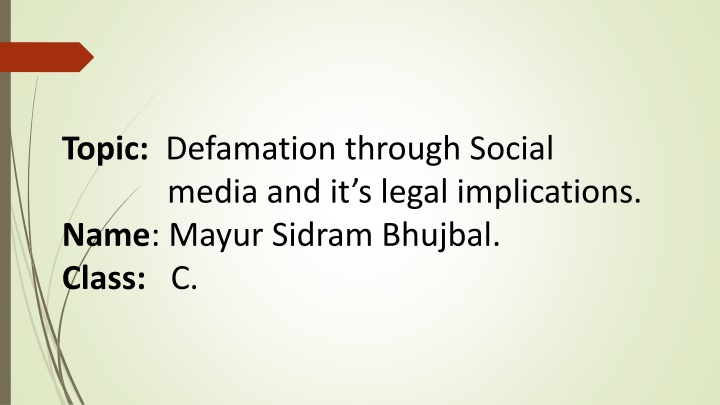
Social Media Defamation: Legal Implications and Identification
Understanding defamation through social media and its legal implications is crucial in the digital age. Explore the nuances of social media defamation, how it can damage reputations, and the key aspects to identify such incidents. Learn about the implications of defamation in various jurisdictions, including the Indian context, and the consequences of making defamatory statements online.
Download Presentation

Please find below an Image/Link to download the presentation.
The content on the website is provided AS IS for your information and personal use only. It may not be sold, licensed, or shared on other websites without obtaining consent from the author. If you encounter any issues during the download, it is possible that the publisher has removed the file from their server.
You are allowed to download the files provided on this website for personal or commercial use, subject to the condition that they are used lawfully. All files are the property of their respective owners.
The content on the website is provided AS IS for your information and personal use only. It may not be sold, licensed, or shared on other websites without obtaining consent from the author.
E N D
Presentation Transcript
Topic: Defamation through Social media and it s legal implications. Name: Mayur Sidram Bhujbal. Class: C.
Defamation Defamation is the making of a false statement concerning a person or business that damages that person s or business s reputation. It is an injury to the reputation of a person resulting from a statement which is false. Reputation is a like a personal property, damage to it liable under the law. In some jurisdictions, defamation is treated as a crime rather than a civil wrong. In India, Defamation can be filed under either criminal law or civil law or cyber crime law, together or in sequence, Different countries has different laws to handle defamation cases. Defamatory statements can be made in two ways: written (known as libel) spoken (known as slander) A person who defames another may be called a "defamer", "libeler", "slanderer", or rarely a "famacide".
Defamation using Social Media With increase of internet demand, defamation on Social media platforms has increased significantly. Social media defamation refers to a libelous or slanderous statement which is made on a social media platform Social media defamation causes significant harm or damage, because of its ability to go viral. Social media platforms which can spread defamations: letters to the editor of local newspapers. public comments on media (i.e., newspaper or magazine) web sites. blogs and comments to blog postings. social media like Facebook, Linkedin, and Twitter. chat rooms or listservers.
Identification of social media defamation The statement made must be defamatory of society generally Publication of a statement which tends to lower a person in the estimation of right thinking members The statement must refer to the plaintiff referred to him/her. In an action for defamation, the plaintiff has to prove that the statement of which he/she complains The statement must be published: defamed, and unless that is done, no civil action for defamation lies. Communication to the plaintiff himself is not enough Publication means making the defamatory statement known to some person other than the person
Implications of defamation Defamation is based on common law, but has recently been codified by the Defamation Act 2013. In a case of someone making a statement about you on social media, you are must establish that the statement complained of is defamatory. Under the Indian Penal Code and the law governing information technology , those found guilty of defamation can be asked to pay a fine a serve up to three years in jail. Indian law, however , does not have specific provisions relating to social media. Under Indian law there is no distinction between libel and slander and both are treated as criminal offenses under section 499 IPC, libel and slander are treated equally. In social media defamation internet or computer is used as a method for harming reputation of a person/group In case of marriage defamation, In the eyes of law, both husband and wife are one person and the communication of a defamatory matter from the husband to the wife or vice versa is no publication and will not come within the purview of section 499. Section 122. Provisions governing social defamation in India IPC section 499, IPC section 500, IPC section 469, IT act 2000 section 66A,
Defenses to defamation claim Defendant can prove that whatever has been said is true about plaintiff. Qualified privilege is another common defense to a defamation action. Sometimes, even if a statement is not absolutely privileged, the context in which it was made means that it should be privileged anyway. An example might be statements a reporter makes about a matter of public interest in the community. Another defense is that person is speaking an opinion, not a fact. Similar to opinion is the defense of "fair comment on a matter of public interest." If, for example, someone makes a statement about the actions of people on a school board, the statement might be protected because there likely is a strong public interest in the activities of the school board.
How to avoid/prevent social media defamation Think carefully about what you re writing. Be specific. Don t post anything when you re angry or emotional. It may look like a fact, make sure whatever you re writing is true. Make it clear when a statement is opinion or joke rather than fact. Avoid making criminal allegations or associating people with terrorist/hate groups. Be cautious when writing about private citizens. Be careful when adding hashtags to the end of your tweets. Avoid sharing false news, modified photos, videos Be prepared to issue a correction or apology.






















